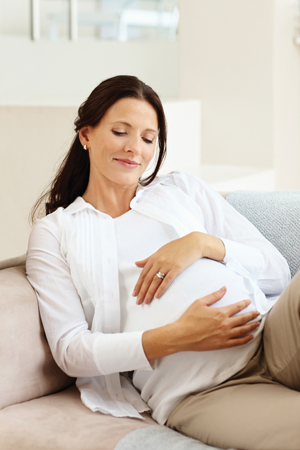So many questions, so little time
Am I too old to have another baby? Do I […]
Am I too old to have another baby? Do I have the patience to do it all over again? How will a baby change the dynamic of my blended family? Will I regret not having another child in a few years when it’s too late?
These are the questionsI have asked myself over and over again for months since getting remarried. My 39-year-old biological clock’s battery is close to dying. “It’s now or never,” I explain to my husband, age 40, as we share a bottle of wine on the back deck of our house one blissful, child-free Saturday night. But then we wonder if we would be messing up a good, seemingly perfect thing. We are so happy right now, and our children (ages 17, 14, 8 and 7) are all well adjusted to our new marriage. How would a baby change things? Is it even safe to consider a new baby at our age?

My husband and I discussed having additional children before getting married and agreed that while we were open to it, the four we already had were probably enough. As our family blended nicely into one, I began to see what a wonderful father my husband was to his two young children—and to mine. I started realizing all the things I had missed by having little ones in those crazy early years while just trying to survive. I began to wonder what it would be like if I could do it all over again—this time, with the knowledge that only comes with age, an established career, greater self-confidence as a mother, financial security, and a partner to balance it all out.
But our conversations about adding to our brood always seemed to leave us with more questions than answers. Still, we knew we had the capacity to love another child and to continue to love one another, and we knew that a new baby would be a perfect way to grow our family and bring us even closer.We decided we should try.
One step forward
We were worried about chromosomal disorders, miscarriage and about a million other things that the internet says could go wrong at my age, so we scheduled an appointment with an OB before putting our hearts 100 percent into the decision to expand our clan. I explained to my doctor that I was there for a possible preconception visit. I was so pleasantly surprised to hear that he and I shared a similar history. He was also remarried with older children, and had decided to “start over” again at a later age. I felt complete relief to know that I wasn’t the only one thinking this way.
He suggested that we start with an AMH (anti-Mullerian hormone) test. An AMH test indicates the level of ovarian reserve, and it’s a simple blood test that can be done at any time during the menstrual cycle. It’s a good place to begin if you’re wondering whether you’re still fertile.
Two steps back
About a week later, I got the test results, and the news was not good. My AMH level came back at 0.28 ng/mL, which indicates a very low or undetectable ovarian fertility potential. We were so sad. We had spent so much time deciding if we wanted to have another baby and to find out that it probably wasn’t possible was heartbreaking.
My OB suggested we see a fertility specialist as soon as possible, so not even a month into our “trying to conceive” journey, I made an appointment with Atlanta Center for Reproductive Medicine (ACRM). Naturally, prior to the appointment, my husband and I were filled with anxiety about what to expect and how far we would be willing to go. We both agreed that IVF (in vitro fertilization) was not an option for us due to the cost and stress involved. But we also wanted to walk away from all of this with no regrets, knowing that we had explored all our options.
According to Kathryn C. Calhoun, MD, FACOG, of ACRM, “Once a woman gets to be in her late 30s to early 40s, there is definitely more of a sense of racing against the clock with the eggs.”
Calhoun suggests anyone over the age of 35 move forward with a fertility assessment, arguing, “If there is a chance you can get pregnant at home, then you should try. But it would be unfortunate to try at home from ages 39 to 40 with blocked tubes that you never knew about. Then you’ve lost a year, and when you are 24 to 25 years old that year doesn’t really matter so much, but at ages 39, 40, 41, that year is a big deal.”
“I never want people to think they have all the time in the world,” Calhoun continues, “but then again, adding stress and anxiety to a situation doesn’t help anyone get pregnant. Stress plays a really big role, and once you start worrying that you can’t conceive, it just gets worse.”
Calhoun advises that advanced maternal age patients “maximize their nutrition and sleep, control stress, get as close to their ideal body weight as possible and exercise regularly.” She admits, “Most people laugh at those things when I suggest them because their lives are so busy, but these things are very important. If you just focus on the medical treatments, you’re missing 75 percent of the picture.” For me, this was excellent news. I felt like I already had a pretty good handle on that 75 percent, soI just had to deal with the medical tests and treatments—the last 25 percent of the infertility frontier.
Full speed ahead
I began the infertility assessment just three days after my initial appointment at ACRM. The first round of blood work showed that everything was in the normal range with the exception of my thyroid, which was a little high. I started thyroid medicine the next day. They also did an ultrasound of my ovaries to look at my ovarian reserve, and found nine follicles (eggs), which they assured me was good news. Nothing happened the first month, but at the end of the second month, I took a pregnancy test, and it showed a very, very, faint line. Three days later, I took another one, and it was definitely positive. But somehow, we couldn’t grasp the fact that it was really positive. How in the world could we be pregnant so quickly? We waited for the blood test a week later to finally confirm our positive result. We were elated.
As it turns out, medically speaking, a simple $18 prescription was all it took for us to conceive. Calhoun warns that she wouldn’t want every 40-year-old woman to think it’s always this easy, but also acknowledges, “You’ve got to have hope, because otherwise you will fall to pieces.” And I couldn’t agree with her more. My advice for anyone approaching their 40s and trying to conceive is to get your mind and body as physically ready as possible, and go through the fertility assessment. Try to have an open mind, as little anxiety as possible, and plenty of hope.
What may seem scary and impossible at first might actually have a very easy solution, but you won’t know unless you go through the assessment. We would have lost such precious time if we hadn’t met with our care provider initially. But now, our baby is due on the same day as my oldest daughter’s high school graduation. How’s that for timing?







